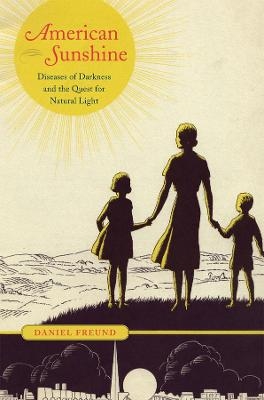
American Sunshine
Diseases of Darkness and the Quest for Natural Light
Seiten
2012
University of Chicago Press (Verlag)
978-0-226-26281-9 (ISBN)
University of Chicago Press (Verlag)
978-0-226-26281-9 (ISBN)
- Titel z.Zt. nicht lieferbar
- Versandkostenfrei innerhalb Deutschlands
- Auch auf Rechnung
- Verfügbarkeit in der Filiale vor Ort prüfen
- Artikel merken
In the second half of the nineteenth century, American cities began to go dark. As hulking new buildings overspread blocks and glass and smog screened out the health-giving rays of the sun, and doctors began to note a resurgence of diseases of darkness like rickets and tuberculosis. This book tracks the American obsession with sunlight.
In the second half of the nineteenth century, American cities began to go dark. As hulking new buildings overspread blocks and pollution obscured the skies, glass and smog screened out the health-giving rays of the sun, and doctors began to note a resurgence of "diseases of darkness" like rickets and tuberculosis. The new problems were met by social reformers, doctors, scientists, and a growing nudist movement, each with their own remedies for America's new dark age. In "American Sunshine", Daniel Freund tracks the American obsession with sunlight from those dark days into the twentieth century. As architects, city planners, and politicians made access to sunlight central to public housing and public health, entrepreneurs, dairymen, and tourism boosters transformed the pursuit of sunlight and its effects into a commodity. Within this historical context, Freund sheds light on important questions about the commodification of health and nature, and makes an original contribution to the history of cities, consumerism, and medicine.
In the second half of the nineteenth century, American cities began to go dark. As hulking new buildings overspread blocks and pollution obscured the skies, glass and smog screened out the health-giving rays of the sun, and doctors began to note a resurgence of "diseases of darkness" like rickets and tuberculosis. The new problems were met by social reformers, doctors, scientists, and a growing nudist movement, each with their own remedies for America's new dark age. In "American Sunshine", Daniel Freund tracks the American obsession with sunlight from those dark days into the twentieth century. As architects, city planners, and politicians made access to sunlight central to public housing and public health, entrepreneurs, dairymen, and tourism boosters transformed the pursuit of sunlight and its effects into a commodity. Within this historical context, Freund sheds light on important questions about the commodification of health and nature, and makes an original contribution to the history of cities, consumerism, and medicine.
Daniel Freund is assistant professor of social sciences at Bard High School Early College.
| Sprache | englisch |
|---|---|
| Maße | 16 x 23 mm |
| Gewicht | 454 g |
| Themenwelt | Geschichte ► Teilgebiete der Geschichte ► Kulturgeschichte |
| Studium ► Querschnittsbereiche ► Prävention / Gesundheitsförderung | |
| Naturwissenschaften ► Biologie ► Ökologie / Naturschutz | |
| Sozialwissenschaften ► Soziologie | |
| ISBN-10 | 0-226-26281-2 / 0226262812 |
| ISBN-13 | 978-0-226-26281-9 / 9780226262819 |
| Zustand | Neuware |
| Haben Sie eine Frage zum Produkt? |
Mehr entdecken
aus dem Bereich
aus dem Bereich
der stille Abschied vom bäuerlichen Leben in Deutschland
Buch | Hardcover (2023)
C.H.Beck (Verlag)
23,00 €
vom Mittelalter bis zur Gegenwart
Buch | Softcover (2024)
C.H.Beck (Verlag)
12,00 €


